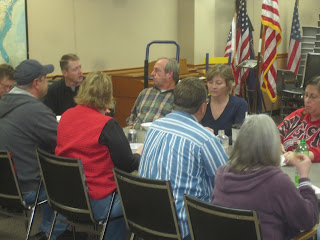Panel: Pesticide Drift & Organic Farms
This will be a panel of farmers
presenting their experiences with pesticide drift onto their organic crops.
Each farmer will review their own experience, and then will field questions
from the floor for the entire panel.
Marnie Jensen; Partner at Husch Blackwell specializing in Food & Agribusiness
Litigation. Marnie provides effective and efficient advice to companies in the
food and agribusiness industries. Her clients include organic agriculture trade
associations and food producers, manufacturers and distributors. Marnie is also
on the board of directors for NSAS.
Paul Swanson; is a Certified Educator in Holistic Management,
Organic Farmer and Re-careered Extension Educator. Paul’s training was with
Alan Savory. swanson5155@windstream.net
Alison Krohn; operates
a part-time prairie seed business: Shoestring Acres Seed. Native grasses and
wildflowers are grown and harvested from her family's farm in Antelope County,
south of Clearwater, Ne. During the week she lives in Lincoln and works for the
Nebraska Department of Roads inspecting construction and maintenance projects
in the southeast part of the state to ensure environmental compliance with
various permits. She has a diverse work background from harvesting seed for
Prairie Plains Resource Institute to teaching in the Landscape Architecture
program at North Dakota State University. For 10 years following graduation she
worked for USDA Natural Resources Service as a landscape architect and RC&D
Coordinator across several states in the southeast and mid-Atlantic
U.S. Alison grew up in Illinois and has a BA in Philosophy from Rockford
College and a Masters degree in Landscape Architecture from the University of
Illinois.
Managing Crops, Profitably, for
Wetlands and Wildlife
Advances in
precision agriculture allow growers to pinpoint fertility inputs and manage
irrigation water to maximize productivity. Evaluating physical and inherent
soil landscape properties in less productive areas often provides opportunities
to benefit wildlife through reduces inputs or participation in financial
assistance programs. Learn about the
wildlife needs growers can satisfy when managing low yielding zones.
Zach Rigg
operates an agricultural and land management consulting business, Rigg Soil
Solutions and is affiliated with Vantage Agri Services, Inc. of Avoca, NE. Rigg
has spent the past two decades inventorying and evaluating soil landscapes to
help growers maximize sustainable agricultural productivity and restore the
function of native plant communities. He has managed wildlife and agricultural
resources for the US Air Force and the US Forest Service as a Soil Scientist in
seven states from Ohio to North Dakota. In addition, Rigg has planned and
assisted implementation of soil quality improvement and wildlife enhancement on
tens of thousands of acres in Nebraska and Missouri through various positions
with the Natural Resources Conservation Service. Rigg was one of the founding
members of the Nebraska NRCS Soil Health Team and aided many early adopting
growers apply soil health principals in Southeast Nebraska. Rigg earned a B.S.
in Agronomy with a Soil Science emphasis in 2004 which was preceded by four years
of service in the US Air Force. He is dedicated to teach growers ways to
exploit productive landscapes and minimize excessive inputs on less productive
areas. Rigg seeks management strategies that provide mutual benefits to
agricultural systems and wildlife.
Improving
Wetlands Using Holistic Grazing of Dairy Cattle & Low Impact Crossings
Without disturbance wetlands
become overrun with invasive species, holistic grazing with low impact
crossings will be explored to improve wetlands and provide valuable forage. Holistic grazing using dairy cows and pastured poultry, including
low impact wetland crossings, will be implemented and monitored with
results shared at a public open house.
Best practices will be explored though a farmer forum with area wetland
graziers.
William & Crystal Powers;
Darby Springs Farm. The farm, Darby Springs Farm, is 40 acres (18 pasture, 20
wetlands). This year, five dairy cows, 50 laying hens and 400 broiler chickens
were raised on pasture. During the project timeframe, the farm will be expanding
to 1000 broilers, and 200 layers.











